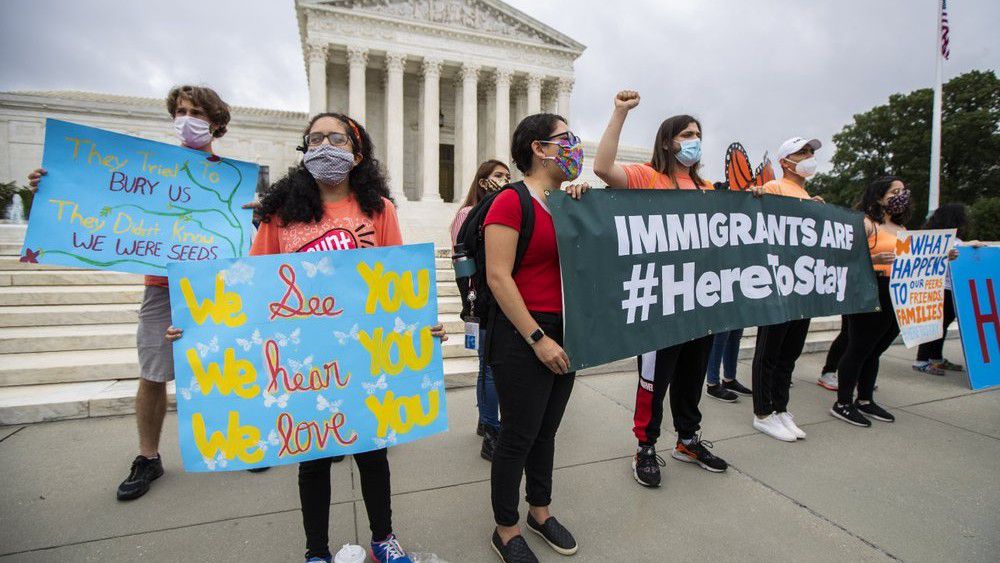LOS ANGELES – Thursday was a day of celebration for the men and women who work for the rights of immigrants. In a 5-4 decision, the U.S. Supreme Court ruled that the Trump administration violated federal law when, in 2017, it ended the Deferred Action for Childhood Arrivals program, an Obama-era initiative created to protect more than 700,000 migrants from deportation.
But for those same people, it’s also a call to redouble their work.
“I’m very happy about this decision,” says Luis Perez, the director of the legal services department for CHIRLA, the Coalition for Humane Immigrant Rights of Los Angeles. But the real goal, he says, is for Congress to pass HR 6, the American Dream and Promise Act, and give immigrants who entered the United States as children a path to permanent residency without fear of deportation. HR 6 passed the House of Representatives in June 2019. It has not yet been heard by the Senate.
“We need a permanent solution. We want the Senate to do the right thing,” he says.
Perez was 9 years old when he came to the United States from Jalisco, Mexico, in 1990, and grew up in the San Fernando Valley.
He’s not a DACA beneficiary — he was three months too old to have fit into the window, which required that immigrants had to be younger than 31 years old on June 15, 2012.
But he was able to gain state-level benefits under 2001’s SB 540, which granted migrant students access to in-state tuition rates for California public universities. He transferred to and graduated from UCLA as an undergrad and was the first undocumented student to graduate from UCLA law school in 2010. He was admitted to the California State Bar in 2018 — before getting his green card.
In his work with CHIRLA, Perez has coordinated the organization’s legal clinic, while the organization has helped to renew two-year work permits for migrants.
Until this week, DACA supporters expected the conservative-leaning Supreme Court to rule in favor of the Trump administration.
“But when we saw the decision around LGBT rights, we saw a chance that this court is doing the right thing,” Perez says, referring to Monday’s Supreme Court ruling that the Civil Rights Act protects gay, lesbian, and transgender workers.
But he was disappointed that the Supreme Court had to make this decision, upholding a lower court ruling that the Trump administration was “arbitrary and capricious,” violating federal laws of administrative procedure.
“That we’re celebrating that they did the right thing says that we’re almost questioning our faith in government," Perez says.
Elected officials from across Los Angeles and the state celebrated the ruling while echoing Perez’s call for Congress to step up.
“Today’s decision is an important victory, for now, for the hundreds of thousands of Dreamers — including over 200,000 Californians — who contribute deeply to their communities each day. They are our neighbors, our coworkers and our friends, and in California, we will continue to have their backs," Gov. Gavin Newsom said in a statement. “We need a permanent solution for undocumented Californians and acknowledge that a pathway to citizenship is not enough. This moment reminds us we are confronting the systemic injustice and racism that exists within our nation and institutions. We will fight for everyone to be treated with dignity and respect.”
“I am relieved that the Supreme Court has seen the illegality of President Trump’s actions, and validated the promises and patriotism of our Dreamers,” says Rep. Lucille Roybal-Allard, a Los Angeles Democrat representing California’s 40th District, and author of HR 6. “Today is a day for celebration and gratitude, but our work is not over.”
The Supreme Court’s ruling does not mean that DACA is safe, however, says Niels Frenzen, director of the USC Gould School of Law Immigration Clinic.
“The decision does not say that the DACA program cannot be terminated. It just has to be terminated through lawful means. The Trump administration now has several options available to comply with the order,” Frenzen says.
“If the administration seeks to terminate the program for reasons that they believe are lawful, that opens the door to new legal challenges and raises questions of timing, and how quickly the administration can act before the November elections and possible changes in Congress as well as in the president," Frenzen continues.



